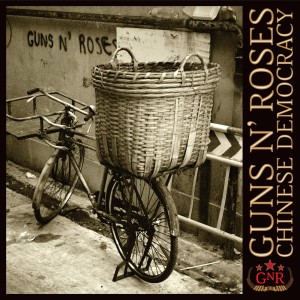 Every once in a while the metal scene collectively pisses on a band or record and someone needs to step up and defend why they like it. We normally don’t spend a lot of time defending shitty records, but sometimes genuinely interesting or good records get lampooned by an overly conservative heavy metal scene and that calls for a professional contrarian to defend it! If ever there were professional contrarians, it would be the staff of AMG. So here we are to re-hash a record from our past that (some of us) love that everyone else seems to have soured on (or never liked in the first place).
Every once in a while the metal scene collectively pisses on a band or record and someone needs to step up and defend why they like it. We normally don’t spend a lot of time defending shitty records, but sometimes genuinely interesting or good records get lampooned by an overly conservative heavy metal scene and that calls for a professional contrarian to defend it! If ever there were professional contrarians, it would be the staff of AMG. So here we are to re-hash a record from our past that (some of us) love that everyone else seems to have soured on (or never liked in the first place).
It’s now almost inconceivable, but there was once a time when Axl Rose was more than just anagram for oral sex. His stage-presence and energy was boundless (read ‘cocaine-fueled’), his signature voice internationally-recognizable (cocaine-fueled) and his band arguably the most popular hard rocking group in the world (again, cocaine-fueled). Appetite for Destruction took the world by storm in 1988 – a year after its quiet initial release – and remains the best-selling debut album of all time in the US. Loaded with anthems such as “Welcome to the Jungle,” “Paradise City” and the hideously-overrated “Sweet Child O’ Mine,” it’s no wonder that Guns N’ Roses achieved their smash success.
It’s this very quality which ensured that trve metalheads received them with much lesser enthusiasm. Guns N’ Roses seemingly fell right into Metallica’s Kill ‘Em All category, with their big hair, sex and drug-driven sensibilities and pop-laced hooks. Conversely, Death’s Scream Bloody Gore and Bathory’s Under the Sign of the Black Mark were making waves in the more underground metal scene, taking things into far darker and more extreme territories. At a time when extreme metal was flexing its muscles and grappling with demons beyond what was commercially acceptable, Guns N’ Roses rose to fame and fortune despite, rather than because of, their metal credibility.
 Fast-forwarding twenty years and through four more studio albums, we reach the controversial ground that is Chinese Democracy. His cocaine-fueled days having caught up with him, Rose found himself the sole original member of the once-untouchable band, finalizing a record over ten years in the making with contributions from twelve contemporary and former members, four session musicians and over forty(!) production, arrangement, orchestration and engineering staff. Before delving into the analysis, and extending this already-excessive preamble, it’s worth noting that Chinese Democracy was critically received with guarded optimism – including in metal publications. This is seemingly in contrast to popular opinion however, with my friends and family and a cursory Google suggesting that many take issue with it (anecdotal evidence is, of course, irrefutable). Indeed, it commercially under-performed considering a budget in excess of $13,000,000. The gauntlet now falls to me to defend and justify what some consider to be “a huge money grab on ex-GnR fans… overly hyped trash likely to end up in the hands of kids with too much allowance money and not enough bubble gum to buy.” – Mike, bubblegum hater and indefatigable MetalSucks comments section commenter.
Fast-forwarding twenty years and through four more studio albums, we reach the controversial ground that is Chinese Democracy. His cocaine-fueled days having caught up with him, Rose found himself the sole original member of the once-untouchable band, finalizing a record over ten years in the making with contributions from twelve contemporary and former members, four session musicians and over forty(!) production, arrangement, orchestration and engineering staff. Before delving into the analysis, and extending this already-excessive preamble, it’s worth noting that Chinese Democracy was critically received with guarded optimism – including in metal publications. This is seemingly in contrast to popular opinion however, with my friends and family and a cursory Google suggesting that many take issue with it (anecdotal evidence is, of course, irrefutable). Indeed, it commercially under-performed considering a budget in excess of $13,000,000. The gauntlet now falls to me to defend and justify what some consider to be “a huge money grab on ex-GnR fans… overly hyped trash likely to end up in the hands of kids with too much allowance money and not enough bubble gum to buy.” – Mike, bubblegum hater and indefatigable MetalSucks comments section commenter.
Quite implausibly, Chinese Democracy is my favorite Guns N’ Roses record. Sure, there are individual tracks which may be superior elsewhere in their discography (“November Rain” is an overwrought masterpiece), but what’s on offer here is their most unified piece, a collection of songs which transcend their disparate geneses into a compelling whole. If not stylistically, tonally there is a strong sense of cohesion across the album, from its throwback opening power chords all the way to the closing trio of ballads (or at least quasi-ballads). Counter to much metalcore and current popular metal, the choruses often undertake the rocking heavy lifting, rather than crushing the verses before hitting clean vox for the chorus. That’s not to suggest that Chinese Democracy is hugely heavy – it isn’t – but it’s refreshing within hard rock for the choruses to pick up as opposed to stripping back.
There’s an overarching sobriety and nobility only hinted at previously, reflectively addressing expectation and the challenges posed by earlier success – lyrically clear in “Better,” “Street of Dreams” and “There Was A Time.” “I.R.S.” is a strange metaphor for investigating lost love (I’m fairly certain there’s no love lost between the IRS and its subjects) and “Madagascar” samples Martin Luther King Jr. in its exploration of freedom. What could have been a heavy-handed and irresponsible bastardization finds sincerity given the surrounding tracks’ musical charm and earnestness.
Such tonal accord is almost unexpected considering the multiplicity inherent to the release – the many contributors poking and prodding with their sticky fingers ensure that it is musically complex despite the unending vocal hooks. A homage to the old Guns N’ Roses can he heard at the opening of “Chinese Democracy,” with heroic power chords resonating out from the near-silence. This is perhaps the most aggressive track, progressing forward into generally lighter material, with frequent utilization of electronica and trip-hop beats, such as on “Shackler’s Revenge,” “If The World” and “There Was A Time.” Nonetheless, this is layered with impressive shredding guitars and solos which add a welcome old-school aesthetic, and emotive orchestrations which contribute to the aforementioned tonal cohesion. This is most evident on such ballads as “Street of Dreams,” “Madagascar” and “This I Love” where the verses are more simplistic and the strings and horns can be highlighted. It’s quite musically diverse but doesn’t feel discordant.

As the center of the swirling vortex, the record’s focus can be attributed to Axl Rose. His fourteen-year investment and ambition shine through, as do his amazing vocals. Pulling the myriad sounds in his direction, the vocal performance sits atop the mix and ensures that all songs are catchy. There’s not much more to say here that hasn’t been said elsewhere, though I do think the diverse material on offer allows him to run the gamut more effectively, from emotive croons, through his signature high-pitched cries and even into an occasional lower range. This is his project despite the sixty or so total contributors.
Let’s not get ahead of ourselves: this is not the second coming and it’s not my favorite album of the new millennium. “Riad N’ The Bedouins” and “Sorry” are both still throwaways. But there is no doubt that it eclipses any prior Guns N’ Roses release and resides in the top tier of ill-comprehended records. The melodies and arrangements are complex but focused, and Rose’s vocals outstanding. So, Mike: ease off yeah? My allowance is depleted, my sweet-tooth satiated. And I still really like Chinese Democracy.

















